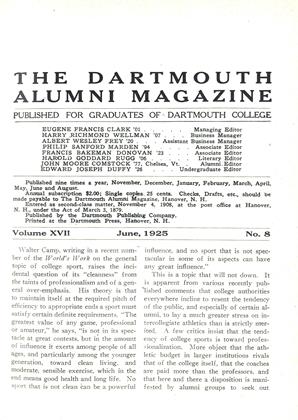The board of overseers of the Thayer School of Civil Engineering, at their recent meeting, placed the direction of the affairs of the school in the hands of the faculty, with Professor Raymond Robb Marsden in charge, with the title of Dean. Professor Marsden succeeds Professor C. A. Holden, whose resignation from the directorship of the school was recently announced.
Professor Marsden received his Bachelor of Science Degree from Dartmouth in 1908, and in the following year was graduated from the Thayer School with the degree of Civil Engineer. In 1909-10 he was an instructor in the Thayer School. From 1910 to 1915 he served as engineer with the H. S. Ferguson Company. From 1915 to 1917 he served as engineer with the Laurentide Company, Ltd. After serving eight months with the Riordon Pulp and Company, he was assigned to war duties as engineer with the Atlas Powder Company. In 1919 he returned to the Thayer School as professor of civil engineering, and has retained this position since that time.
President Hopkins has outlined the aims of the Thayer School and the overseers are agreed to follow the policy as he has laid it down. It is as follows :
"The policy of the Thayer School of Civil Engineering is based upon the theory that the purpose of an education is to give a man breadth and depth in his knowledge. In the field of civil engineering, therefore, the educated engineer, under the policy of the Thayer School, must first of all have acquired the general culture which it is the purpose of a college education to give and must then have superimposed upon this, specialized knowledge in regard to the scope of the field of engineering and the various facts which have to do with basic principles essential to a civil engineer.
"In other words, it is the purpose of the school to give to the college educated man knowledge of the fundamental theory and practice of engineering, but at the same time to induce him to see the relationship of engineering to life as a whole."
 View Full Issue
View Full Issue
More From This Issue
-
 Article
ArticleANNUAL MEETING OF THE SECRETARIES—MAY 1-2, 1925
June 1925 -
 Article
ArticleWalter Camp
June 1925 -
 Article
ArticleDARTMOUTH COLLEGE ENGRAVINGS
June 1925 By Harold Goddard Rugg '06 -
 Article
ArticleFROM THE UNDERGRADUATE CHAIR
June 1925 -
 Article
ArticleNEW CURRICULUM IS ADOPTED; A. B. ONLY DEGREE TO BE GIVEN
June 1925 -
 Class Notes
Class NotesClass of 1917
June 1925 By Ralph Sanborn








